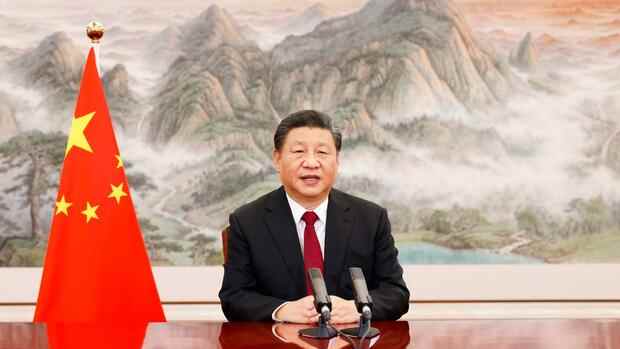China’s president wants to further expand his power in 2022.
(Photo: AP)
Berlin At the moment, relations between Europe and China are like a major construction site: the political foundation is cracking, the economic situation appears shaky, and expansion is faltering. These are the most important results of the new China survey by the Mercator Institute for China Studies (MERICS), which is available exclusively to the Handelsblatt.
More than two-thirds of the 850 China experts surveyed expect that political relations between Europe and the Middle Kingdom will deteriorate. At the same time, half of the experts still hope that the economic ties will not be damaged. Compared to the Merics China Forecast surveys of 2019 and 2020, skepticism has grown.
The survey comes at the beginning of a year when China, with its trade boycott against Lithuania, is for the first time politically blackmailing an EU member and thus challenging the community. The point of contention is the opening of a Taiwan representation in Vilnius. The CAI investment protection agreement between Beijing and Brussels, which has already been negotiated but blocked by the EU Parliament, is on hold. Here, too, it is about political differences in the question of human rights.
The US is putting pressure on Europe
While Beijing is closely following the new German government’s course on China, the US is putting pressure on Europe to close ranks with its system rival. And the Winter Olympics in Beijing, which begin next week, are causing upset, as several EU countries, including Germany, are still considering a diplomatic boycott.
Top jobs of the day
Find the best jobs now and
be notified by email.
The experts do not expect China’s nationalist course to change in the new year. More than 85 percent expect President Xi Jinping to expand his power base indefinitely after the important 20th party congress in the fall. In the opinion of two-thirds of those surveyed, this also includes the state taking the Chinese economy closer to the party leash. This applies in particular to the large technology companies: almost 90 of the experts expect that Beijing will intervene more in the interests of “Big Tech”.
The pursuit of economic and technological autonomy will continue to play a prominent role for the Chinese leadership this year.
(Photo: dpa)
That the noticeable weakness in growth – the International Monetary Fund (IMF) only expects an increase in gross domestic product (GDP) of 4.8 percent in its latest forecast for 2022, after 8.1 percent in the previous year – is only believed to lead to economic tensions ten percent. “The domestic political conditions in China will not undermine the country’s political stability,” agrees Ian Bremmer, president of the New York-based policy consultancy Eurasia Group.
In Bremmer’s opinion, China’s biggest problem is home-made: the Chinese “zero Covid” strategy for fighting the pandemic. The political adviser warns that this policy is putting a strain on consumption and growth while at the same time promoting greater social tensions. Beijing needs to do more to help the economy, but this could undermine reform goals and financial stability.
In the Merics survey, just under ten percent of the experts still believe that the recovery after the pandemic will determine the country’s economic development in 2022.
On the other hand, the pursuit of economic and technological autonomy will continue to play a prominent role for the Chinese leadership this year. The socio-economic stability of the country with its 1.3 billion inhabitants still has priority. However, a third of the experts surveyed assume that technological autonomy in particular will determine Beijing’s economic policy course.
Beijing is decoupling technologically
In order to realize his vision of technological self-sufficiency, economic security and social harmony, Xi wants to force all elements of Chinese society to accept a new normality of tightened regulation, Eurasia boss Bremmer suspects.
In the area of so-called green technologies in particular, a majority of respondents expect a “certain” intensification of trade, investment and research relations. However, in more security-sensitive areas such as semiconductors, chips and 5G, most expect mutual cooperation to decline.
Among other things, the China experts were asked about the Winter Olympics, which the respondents believe will not help to improve China’s image in the world. The majority of experts even believe that the Olympics will have a rather negative effect on China’s image.
More: Follow the Merics China Forecast 2022 conference live with Handelsblatt as media partner

